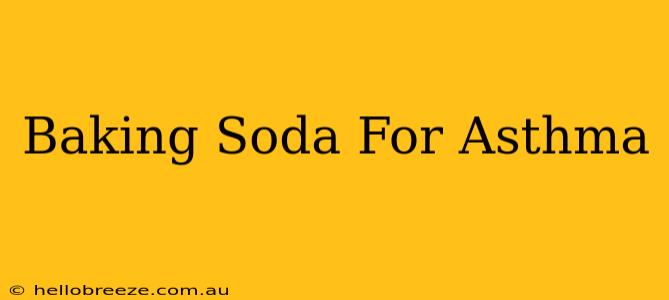Asthma is a chronic respiratory condition affecting millions worldwide. While conventional treatments exist, many seek natural remedies to manage their symptoms. Baking soda, a common household item, has gained attention as a potential asthma aid. But does it actually work? Let's delve into the research and explore the potential benefits and risks of using baking soda for asthma relief.
Does Baking Soda Help with Asthma?
The purported benefits of baking soda for asthma stem from its alkaline properties. Some believe that inhaling baking soda or consuming it in solution can neutralize the acidity associated with asthma attacks, thereby alleviating symptoms. However, scientific evidence supporting this claim is limited and largely anecdotal.
While baking soda can neutralize acid, its effectiveness in treating the complex inflammatory processes underlying asthma is questionable. Asthma isn't simply a matter of acidity; it involves airway inflammation, bronchoconstriction, and mucus production. Baking soda's impact on these key aspects of asthma remains largely unproven.
Potential Benefits (Limited Evidence)
Some individuals report experiencing temporary relief from asthma symptoms after using baking soda. This could be due to:
- Reduced mucus: Some believe the alkaline properties might help thin mucus, making it easier to cough up. However, this effect hasn't been rigorously studied in the context of asthma.
- Placebo effect: The belief that a treatment will work can sometimes lead to real improvement in symptoms, a phenomenon known as the placebo effect.
Potential Risks
While generally safe for consumption and topical use, using baking soda for asthma treatment carries potential risks:
- Inhalation risks: Inhaling baking soda powder can irritate the lungs, potentially worsening asthma symptoms rather than alleviating them. Never inhale baking soda directly.
- Allergic reactions: Some individuals may be allergic to baking soda, experiencing skin irritation, respiratory problems, or other allergic reactions.
- Electrolyte imbalance: Consuming large quantities of baking soda can disrupt electrolyte balance, potentially leading to health issues. Always consult a doctor before using baking soda internally.
- Delayed or insufficient treatment: Relying solely on baking soda for asthma management could delay or prevent the use of proven, effective treatments, potentially leading to serious health complications.
What the Research Shows (or Doesn't Show)
There's currently a lack of robust clinical research evaluating the efficacy of baking soda as an asthma treatment. Most available information is based on anecdotal evidence or small, preliminary studies that haven't been replicated or peer-reviewed extensively. More research is needed to definitively determine if baking soda offers any real benefit for asthma management.
Asthma Treatment: The Importance of Conventional Medicine
It is crucial to emphasize that baking soda is not a substitute for conventional asthma treatment. Asthma is a serious condition requiring appropriate medical management. Effective treatments include:
- Inhalers: These deliver medication directly to the lungs, providing quick relief from symptoms.
- Controllers: These medications help prevent asthma attacks by reducing inflammation.
- Other therapies: Depending on the severity of your asthma, your doctor might recommend other therapies like allergy shots or lifestyle changes.
Always consult your doctor or other qualified healthcare professional before starting any new treatment, including the use of baking soda for asthma. They can help you develop a safe and effective asthma management plan.
Conclusion
While some individuals report subjective relief from using baking soda for asthma, strong scientific evidence supporting its effectiveness is lacking. The potential risks associated with inhalation or excessive internal use outweigh the unproven benefits. Always prioritize conventional medical treatment for asthma and consult with your doctor before experimenting with alternative remedies. Remember, safe and effective asthma management is paramount to maintaining your respiratory health.

